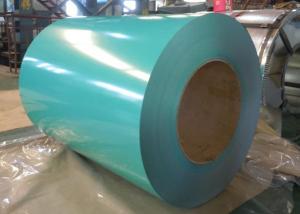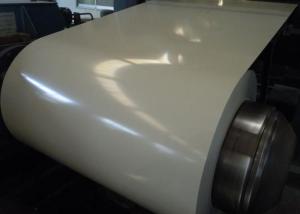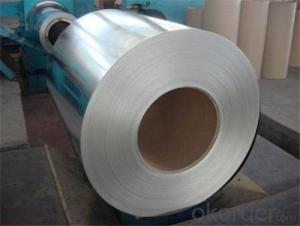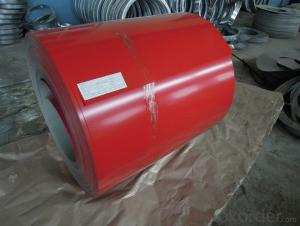Best Quality for Prepainted Aluzinc Steel Coil
- Loading Port:
- China Main Port
- Payment Terms:
- T/T or L/C
- Min Order Qty:
- 50mt m.t.
- Supply Capability:
- 100000 mt/year m.t./month
OKorder Service Pledge
OKorder Financial Service
You Might Also Like
General Informationof Prepainted Aluzinc Steel Coil
|
Thickness 0.23-1.2mm (BMT) |
|
Width 900-1250mm |
|
Alu-zinc Coating: 50-150g/m2 |
|
Internal Diameter 508mm or 610mm |
|
Color According to RAL color fan |
|
Coil Weight 4-8MT |
|
Quality Commercial and structural quality |
|
Paint Polyester paint for topside, epoxy for reverse |
|
Standard JIS G 3322, ASTM A755M, EN 10169 |
|
Base Steel Grade SGCC, SGCD, DX51D+Z DX52D+Z; S200GD, S220GD, S280GD,S350GD,CS,FS,SS |
Technical Data of Prepainted Aluzinc Steel Coil
|
Chemical Composition |
C |
Si |
Mn |
P |
S |
|
0.04-0.06% |
0.01-0.03% |
0.18-0.22% |
0.014-0.016% |
0.006%-0.009% |
|
Technical Data | |
|
Yield Strength |
(Mpa) 280-320 |
|
Tensile Strength |
(Mpa) 340-390 |
|
Elongation |
20%-30% |
|
Reverse Impact |
9J |
|
T-bending |
≥2T |
|
Pencil Hardness |
≥2H |
|
Duration Of Salt Spray Test |
500 H |
|
Bending At 180 Degree |
No crack, purling and fraction |
Package of Prepainted Aluzinc Steel Coil
Full wrapped with anti-damped paper inside, iron sheet wrapped outside, and bundled by iron strips
Applicationof Prepainted Aluzinc Steel Coil
It can be widely used in transportation, light industry, civil usage and farming. It is also the perfect building material in construction for making steel roofing, corrugate sheet, sandwich panel for wall or roofing, facade wall, shutters and home appliance.
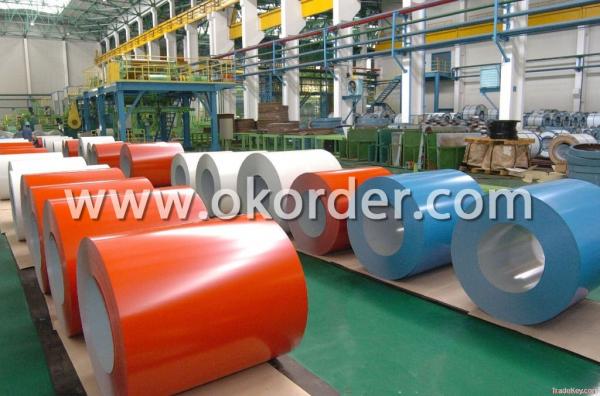
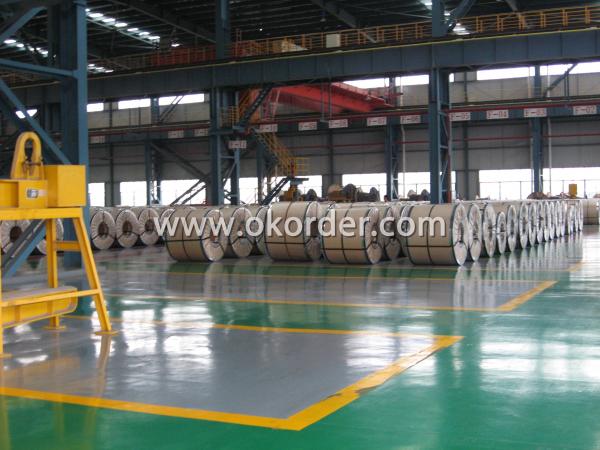
- Q:How are steel coils used in the manufacturing of storage cabinets?
- Steel coils are used in the manufacturing of storage cabinets by being processed and formed into sheets, which are then cut, shaped, and welded together to create the structural framework and outer shell of the cabinets.
- Q:What are the different methods of protecting steel coils from corrosion?
- There are several methods of protecting steel coils from corrosion, including applying a protective coating, using corrosion inhibitors, implementing proper storage and handling practices, and utilizing galvanization or electroplating techniques.
- Q:What are the different types of coatings applied to steel coils?
- Steel coils can be coated with a variety of coatings, each serving a specific purpose and offering unique advantages. 1. Galvanized Coating: Among the most frequently used coatings for steel coils is the galvanized coating, which entails the application of a layer of zinc to the steel surface. Galvanized coatings offer exceptional corrosion resistance, making them ideal for outdoor applications where the steel may come into contact with moisture or harsh environmental conditions. 2. Galvalume Coating: Similar to galvanized coating, galvalume coating also involves the application of a zinc layer to the steel surface. However, it incorporates a small amount of aluminum as well. This addition enhances the coating's corrosion resistance and improves heat reflectivity. Galvalume coatings are commonly employed in roofing and cladding applications. 3. Pre-painted Coating: Pre-painted coatings encompass the application of a layer of paint or primer to the steel surface. This type of coating allows for customization in terms of color and finish. Pre-painted coatings not only enhance the steel's aesthetic appeal but also provide added protection against corrosion and weathering. 4. Organic Coating: Organic coatings are typically applied as a topcoat over galvanized or galvalume coatings. They are composed of various resins, such as polyester, epoxy, or polyurethane, which offer additional protection against corrosion, abrasion, and chemicals. Organic coatings are frequently utilized in industries that prioritize both durability and aesthetics, such as the automotive sector. 5. Metallic Coating: Metallic coatings, such as aluminum or zinc, are applied to steel coils using the hot-dip coating process. These coatings deliver exceptional corrosion resistance and are commonly used in applications where the steel is exposed to high temperatures or corrosive environments. 6. Chromate Conversion Coating: Chromate conversion coatings are primarily applied to steel coils for their corrosion resistance properties. They are frequently employed in electrical applications to safeguard against galvanic corrosion and enhance conductivity. Ultimately, the choice of coating for steel coils is contingent upon specific application requirements, including the desired level of corrosion resistance, aesthetic considerations, and environmental factors.
- Q:Is Carbon Steel strong for swords?
- Depends on the sword design. Some swords are high carbon, some a low carbon, some are made from a billet of alternating high and low carbon ('Damascus' steels). It all depends on what characteristics you want for your sword. Softer steels won't hold an edge as well but they offer great flexibility so your sword won't shatter when they make impact with armor or shields. Harder steels hold better edges but they're prone to binding in wooden shields and then being broken as soon as a bending force is applied along the weak axis of the blade. Japanese Katanas have both hard and soft steels to allow the blade to bend yet still hold strong edges. If you're making the sword from raw materials on your own, look up some different recipes for crucible steel. It's probably the most fun and involved process.
- Q:is it much difference between 1095 and 1080,,,1065,,,1060 or even 1045 steel?please help and thanks!
- The guy below me obviously has no idea WTF he's talking about. It does NOT have anything to do with the edge angle at which the blade is sharpened. It does NOT have to do with heat treating. Both of these things are important, but they won't determine the type of steel. I'll try to help. 1095 is one of the best performing steels, against carbon steel or stainless steel, in the world. It's incredibly hard, holds its edge well and comes to a beautiful edge when sharpened correctly. As you know though, carbon steels need to be properly maintained to avoid rust/corrosion. Out of the steels you listed I'll give a brief summary of each steel... -1095 (Great all around steel, but is brittle by comparison to the others. This doesn't mean it will chip easily, but the other steels can take more of a beating. That being said, this is going to take a nicer edge, and hold it longer.) -1080 (A little bit more flexible and less liable to chip than 1095. A good compromise between edge retention/quality and ruggedness. -1065 (Commonly used in machetes and other heavy duty bush tools. Takes a decent utility edge and is highly unlikely to chip) -1060 1045 (Both extremely flexible and soft in comparison to 1095. Unlikely to chip, but it takes a crude edge. This edge will cut, but not like 1095 will.) Go with 1095. My favorite knife I own is in 1095 and serves me well everytime I head off into the woods. Keep some Rem-Oil on that bad boy though.
- Q:What are the common surface defects found in steel coils?
- Some common surface defects found in steel coils include rust, scratches, dents, pits, and mill scale.
- Q:How are steel coils used in the manufacturing of industrial mixers?
- Steel coils are often used in the manufacturing of industrial mixers as they provide the necessary strength and durability required for the equipment. These coils are typically used to construct the main body and components of the mixers, ensuring they can withstand the high-intensity mixing processes and heavy loads that they encounter in industrial settings.
- Q:How do steel coils contribute to energy performance in buildings?
- Steel coils contribute to energy performance in buildings primarily through their use in HVAC systems. Steel coils are commonly used in heating, ventilation, and air conditioning (HVAC) systems as heat exchangers or condenser coils. These coils help in transferring heat between the indoor and outdoor environments, allowing for effective heating or cooling of the building. The high thermal conductivity of steel enables efficient heat transfer, optimizing energy usage and enhancing the overall energy performance of the building. By facilitating appropriate temperature control and reducing energy consumption, steel coils play a vital role in improving the energy efficiency of buildings.
- Q:Can steel coils be transported by air?
- Yes, steel coils can be transported by air.
- Q:What are the dimensions of steel coils used in the railway equipment industry?
- The railway equipment industry utilizes steel coils with dimensions that can vary according to the specific application and requirements. However, there are commonly observed dimensions for these steel coils, typically ranging from 3 to 5 feet in width and 10 to 15 feet in length. Likewise, the thickness of the steel coils exhibits variation, spanning from 0.01 to 0.5 inches. It should be noted that these dimensions are not set in stone and may fluctuate based on the specific demands of the railway equipment industry, such as the type of equipment being produced or the distinct purpose of the steel coils.
1. Manufacturer Overview |
|
|---|---|
| Location | Jiangsu, China |
| Year Established | 2003 |
| Annual Output Value | US$1 Million - US$2.5 Million |
| Main Markets | Southern Asia; America; South America; Eastern Europe |
| Company Certifications | ISO 9000 ISO 14000 OHSAS 18000 |
2. Manufacturer Certificates |
|
|---|---|
| a) Certification Name | |
| Range | |
| Reference | |
| Validity Period | |
3. Manufacturer Capability |
|
|---|---|
| a)Trade Capacity | |
| Nearest Port | Shanghai |
| Export Percentage | 1% - 10% |
| No.of Employees in Trade Department | 100 People |
| Language Spoken: | English; Chinese |
| b)Factory Information | |
| Factory Size: | Above 200,000 square meters |
| No. of Production Lines | 14 |
| Contract Manufacturing | Design Service Offered |
| Product Price Range | Average |
Send your message to us
Best Quality for Prepainted Aluzinc Steel Coil
- Loading Port:
- China Main Port
- Payment Terms:
- T/T or L/C
- Min Order Qty:
- 50mt m.t.
- Supply Capability:
- 100000 mt/year m.t./month
OKorder Service Pledge
OKorder Financial Service
Similar products
New products
Hot products
Hot Searches
Related keywords

